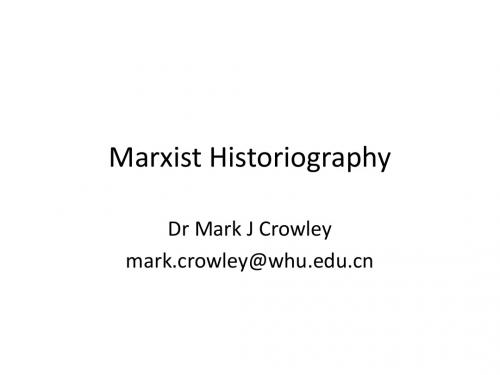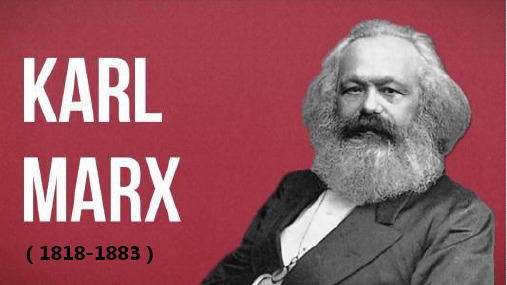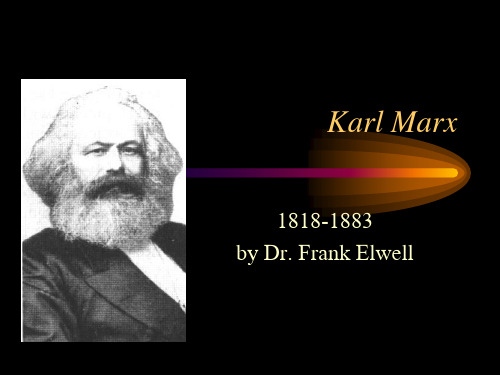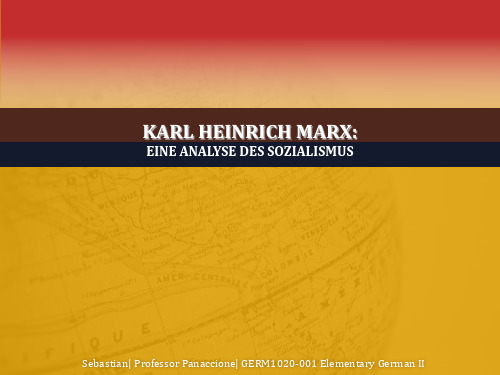karl marx英语课件PPT
05-马克思主义史学英语课件Marxist Historiography

Classical Marxism
• Economy was central to everything • Explanation for the collapse of capitalism • Political change linked to economic change
Karl Marx
Others
• Lumpenproletariat: criminals, vagabonds, beggars - sell their labour to the highest bidder. • Landlords: an historically important social class who retain some wealth and power. • Peasantry and farmers: a disorganised class incapable of effecting socio-economic change
• • • • • • Thorold Rogers GDH Cole Eric Hobsbawm E P Thompson Raphael Samuel Christopher Hill
British Marxist Historians
• Communist Party of Great Britain (1946) and disbanded in 1956-7 (crisis of Communism) • Society for the Study of Labour History (1960) • Built on the work of Tawney and Cole
European Feudal System
高中英语第1册第21单元KarlMarx

高中英语第1册第21单元KarlMarx一、教法建议【抛砖引玉】单元双基学习目标Ⅰ . 词汇学习have a talk with , meaning , woodcutter , come across , cut up , homeland , before long , move on , keep on , works , master, freely, doctor, peasant , unite , progress, make progress , native , force , base , revolutionary, limited , rapid , article , praise , encourage , situation , spirit, translate , translate…into…, university , degree , communism , social , idiom , vocabulary Ⅱ . 交际英语语言学习1 . How are you getting on with your English lessons ?2 . My grammar is improving , but I find idioms and useful expressions hard to learn .3 . Are you making good progress ?4 . I find…easiest most difficult .Ⅲ . 语法学习用一般过去式表示过去完成时一般过去时表示过去某时间发生的动作或存在的状态。
而过去完成时则表示过去某一时间或动作以前就完成了的动作或已存在的状态。
但是,在含有由"before"和"after"引导的从句的主从复合句中,由于before 和after 本身的词义已经表明了时间的先后,故可以不用过去完成时,而用一般过去时替代。
Karl Marx马克思英文介绍

three Origins of Marxism
1. The German classical philosophy 2. The British classical political economics 3. French utopian socialism
Marx&Engels
• . On 28 August 1844, Marx met the German socialist Friedrich Engels at the Caféde la Régence, beginning a lifelong friendship.
1.人生就像一杯茶,不会苦一辈子,但总会苦一阵子。只要心态不老, 只要信念不消,不管多远的路,都会有尽头。
2. 一个人如果对自己的事业充满热爱,并选定了自己的工作愿望,就会 自发地尽自己最大的努力去工作。如果一个人一生当中没有任何目标, 那他就会迷失自己。
3. 每个人都有觉得自己不够好,羡慕别人闪闪发光的时候,但其实大多 人都是普通的。不要沮丧,不必惊慌,做努力爬的蜗牛或坚持飞的笨 鸟,在最平凡的生活里,谦卑和努力。
Influence
•Marx has been described as one of the most influential figures in human history. •Many intellectuals, labour unions and politica l parties worldwide have been influenced by Marx‘s ideas, with many variations on his groundwork.
Thanks for watching!
karl marx完美版

Questions:
1.In what country was Karl Marx born?And his native language?
German Germany
2.What did Engels do when he found Marx had made rapid progress in
Because he found it important to study the situation in Russia.
1.Marx was forced to leave Germany
__C___.
A when he was in his fifties B in the year 1849 C when he was young
Marx studied E_n_g_l_is_h F_r_e_n_c_h and _R_u_s_si_a_n in his life.
A Germany Russian Chinese B Germany English French C Russian French Germany D English French Russian E English Chinese Russian
1.In what country was Karl Marx born?And his native language? 2.What did Engels do when he found Marx had made rapid progress in English? 3.What did Marx say about Engels’ praise? 4.What was Marx not sure about in learning English? 5.What did he do with his English later on?
Karl Marx

KARL MARX
Personally, I like to call him the last of the old Testament prophets. He basically prophesized that man would someday create a paradise on earth. That we would all someday live in brotherhood, sharing our talents and our wealth.
Secondary Needs
The production of new needs evolve when means are found to allow the satisfaction of older ones. Humans engage in antagonistic cooperation as soon as they leave the communal stage of development in order to satisfy their primary and secondary needs.
Major Intellectual Contributions:
1. Elaboration of the conflict model of society, specifically the theory of social change based upon antagonisms between social classes;
KARL MARX
But in this presentation we will focus on his role as a sociological theorist. His writings have had an enormous impact on all of the social sciences, but particularly upon sociology.
karlmarks高中课文

karlmarks高中课文摘要:一、卡尔·马克思高中的背景介绍1.学校的地理位置2.学校的历史沿革3.学校的教学理念二、卡尔·马克思高中的课程设置1.必修课程2.选修课程3.特色课程三、卡尔·马克思高中的教学质量1.优秀的教师团队2.现代化的教学设施3.高质量的课程资源四、卡尔·马克思高中的学生发展1.丰富的课外活动2.良好的学习氛围3.全面的素质培养五、卡尔·马克思高中的毕业生去向1.优秀的高校录取率2.多元化的职业选择3.良好的社会口碑正文:卡尔·马克思高中是一所位于我国某城市的知名学府,学校自创立之初,始终秉承“厚德、博学、求是、创新”的校训,致力于为学生提供优质的教育资源。
学校地理位置优越,校园环境优美,为学生提供了一个良好的学习和生活环境。
学校历史悠久,拥有一支经验丰富、教学水平高的师资队伍。
在教学理念上,学校注重培养学生的综合素质,强调理论与实践相结合,旨在培养具有创新精神和实践能力的优秀人才。
在课程设置方面,卡尔·马克思高中既有严谨的必修课程,又有丰富多彩的选修课程。
必修课程涵盖语文、数学、英语、物理、化学、生物、政治、历史、地理等国家课程标准要求的内容。
选修课程则根据学生的兴趣和发展需求,提供诸如艺术、体育、科技等多样化的课程供学生选择。
此外,学校还开设有一系列特色课程,如国际理解、创新实验等,旨在拓宽学生的视野,提升学生的实践能力。
为了保证教学质量,学校投入大量资金改善教学设施,为教师提供先进的教学设备。
同时,学校注重教师队伍建设,定期组织教师进行专业培训,提高教育教学水平。
在高质量的课程资源的保障下,学生的学习成果得到了显著提升。
在学生发展方面,卡尔·马克思高中注重学生的全面成长。
学校开展丰富多样的课外活动,如文学创作、艺术表演、体育竞赛等,充分挖掘学生的潜能,培养学生的兴趣爱好。
此外,学校还倡导自主学习,通过成立学科竞赛团队、举办讲座等方式,激发学生的学习兴趣,培养学生的自主学习能力。
马克思英文介绍精编版

“YOU ARE HORRIFIED AT OUR INTENDING TO DO AWAY WITH PRIVATE PROPERTY. BUT IN YOUR EXISTING SOCIETY, PRIVATE PROPERTY IS ALREADY DONE AWAY WITH FOR NINE-TENTHS OF THE POPULATION; ITS EXISTENCE FOR THE FEW IS SOLELY DUE TO ITS NONEXISTENCE IN THE HANDS OF THOSE NINE-TENTHS. YOU REPROACH US, THEREFORE, WITH INTENDING TO DO AWAY WITH A FORM OF PROPERTY, THE NECESSARY CONDITION FOR WHOSE EXISTENCE IS THE NONEXISTENCE OF ANY PROPERTY FOR THE IMMENSE MAJORITY OF SOCIETY.”
• Karl Marx was privately educated until 1830, when he was enrolled in the Trier High School where he studied philosophy and social science. The school was raided in 1832 by police because of the liberal humanist views taught to the students in angst of the Prussian government.
unit21 Karl Mark 的课件(老教材)

Multiple choice
C . 1. Marx was forced to leave German_______ A. when he was in his fifties B. in the year 1849 C. When he was young D. because he made London the base for his revolutionary work B 2. When Marx came to England, he ______. A. knew little English B.knew some English C. didn't know any English, but he knew French D. Knew English quite well
In Belgium. He left German for political reasons.
4. Where did he stay before he went to London?
In France 5. Why did he go to London? He wanted to make London the base for his revolutionary work. 6. What did Engels do when he found Marx had
Important language points 1. be forced to do sth. 2. Make +n.+Oc. 3. such..that …
so … that…
4. make progress
5. praise sb. for sth
Homework
- 1、下载文档前请自行甄别文档内容的完整性,平台不提供额外的编辑、内容补充、找答案等附加服务。
- 2、"仅部分预览"的文档,不可在线预览部分如存在完整性等问题,可反馈申请退款(可完整预览的文档不适用该条件!)。
- 3、如文档侵犯您的权益,请联系客服反馈,我们会尽快为您处理(人工客服工作时间:9:00-18:30)。
1.In what country was Karl Marx born?And his native language? 2.What did Engels do when he found Marx had made rapid progress in English? 3.What did Marx say about Engels’ praise? 4.What was Marx not sure about in learning English? 5.What did he do with his English later on?
TRUE OR FALSE
1.Marx’s native language is German. 2.As a young man Marx was forced to leave his homeland. 3.When Marx got to England ,he found his English was good enough. 4.Marx was not sure about two things -- the spelling and some of the idioms.
Marx studied E_n_g_l_is_h F_r_e_n_c_h and _R_u_s_si_a_n in his life.
A Germany Russian Chinese B Germany English French C Russian French Germany D English French Russian E English Chinese Russian
5.The civil War in France was written in French. 6.In the 1870s,when Marx was over 50, he began to learn Russian. 7.In 6 months Marx learned enough to read articles and reports in Russian. 8.When we are learning a foreign language, we should translate everything into our language.
2.When Marx came to England, he _B___.
A knew little English B knew some English C didn't know any English, but he knew
French.
3.Engels wrote to Marx and praises him
English? He praised him .
3.What did Marx say about Engels’ praise?
He said Engel’s praise had greatly encouraged him.
4.What was Marx not sure about in learning English?
well enough to read articles.
A four months
B five months
C six months
D seven months
7. Marx gave some advice on how to learn a foreign language.Which one is
France?
A England
B Germany
C Russia
D Belgium
5.Marx began to learn Russian
__C____.
A in his fifties
B in his sixties
C in the 1880s
D in the 1860’s
6.It took him __C__ to learn Russian
6.Why did Marx start learning Russian?
Questions:
1.In what country was Karl Marx born?And his native language?
German Germany
2.What did Engels do when he found Marx had made rapid progress in
Lesson 82
HOW MARX LEARNED
FOREIGN LANGUAGES
Karl Marx
German
Germany
Engels
Karl Marx
共产党宣言
The Communist Manifesto
Which foreign languages did Marx study?
for his good English after he _C_.
A read Marx’s letters to him
B received Marx’s letter to him
C read Marx’s articles in an American newspaper
4.Marx stayed in __D__ before he went to
The grammar and some of the idioms
5.What did he do with his English later
on? He kept on studying and using English
6.Why did Marx start learning Russian?
Because he found it important to study the situation in Russia.
1.Marx was forced to leave Germany
__C___.
A when he was in his fifties B in the year 1849 C when he was young
